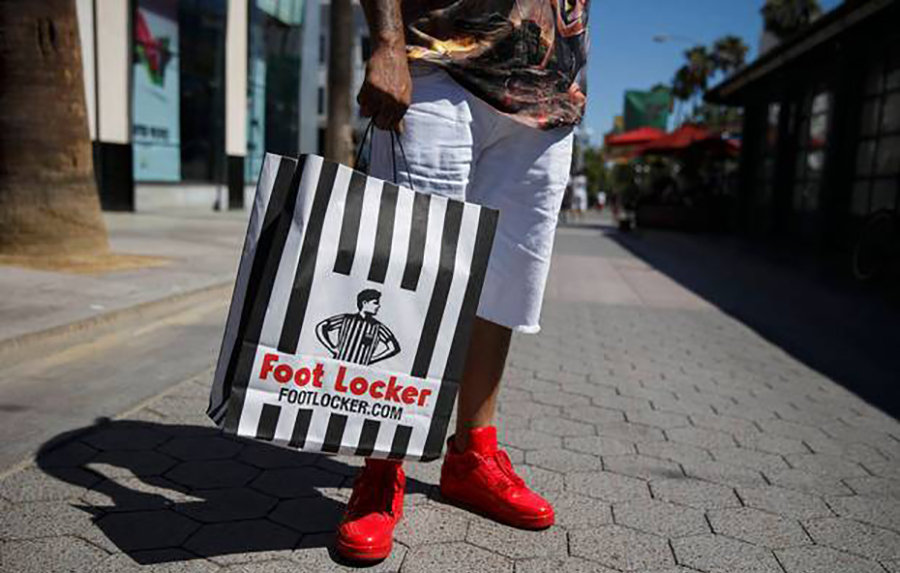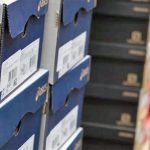<span style="color: #999999;">With the fourth tranche of tariffs on $300 billion worth of products soon arriving, trade talk has again returned as a popular topic on retailers’ second-quarter conference calls. A few cut full-year earnings due to the likely impact while others deferred, saying they were still figuring out the impact.
All retailers indicated they were in deep conversations with their vendors on how to mitigate the impact of tariffs. Most were also hopeful they’d avoid having to raise prices to offset the tariff costs, at least for holiday selling.
The conference calls took place before last Friday when President Trump threatened to raise tariffs even higher and ordered U.S. companies to exit China after Beijing unveiled retaliatory tariffs on $75 billion in U.S. goods. On Monday, Trump more optimistically claimed China was willing to reopen talks on the trade war.
The following are some comments from retailers on recent quarterly conference calls.
Foot Locker said its guidance for the current year doesn’t contemplate any tariff impact and officials are “actively discussing the subject” with vendor partners in order to limit the impact to business and consumers.
Asked about mitigation efforts, Richard Johnson, Foot Locker’s CEO, said that with its private-label offerings, the retailer is working directly with suppliers and exploring sourcing alternatives. He said, “We’re looking for different sourcing and we’ll figure out from a pricing perspective what we have to do to cover the gap again because tariffs are ultimately a tax on the end consumer. And we need to figure that out how to soften that blow for the consumer.”
As far as footwear, “fluid” conversations are going on with vendor partners. Said Johnson, “There’s a lot of energy in the industry to try to get the footwear piece of the tariffs postponed or pulled out of the next rollout. If they happen again we will continue to work with our vendors to understand whether that’s an impact that will more than likely be in the early part of 2020 as opposed to the back half of 2019. But again each of those discussions is a little bit different because each of our vendors has different sourcing locations and the products that we buy are frequently sourced in different locations.”
Dick’s Sporting Goods expects a minor impact from tariff headwinds in the second half while acknowledging too many unknowns remain to determine their impact on 2020. The tariff tranches that are set to become effective on September 1 and December 15 are incorporated in guidance.
Dick’s said it has purchase orders written across the impacted apparel items and most of its affected hardlines categories for the rest of the year. Lee Belitsky, CFO, said the combination of inventory on hand and purchase orders should lead to a “relatively minor impact” from tariffs in the second half. For 2020, Dick’s isn’t providing guidance given a wide range of mitigation options available, including sourcing changes and further negotiations with vendors.
Ed Stack, chairman and CEO, was optimistic that the impact would remain minimal. He said, “We’ve worked with a number of vendors, even going into the spring of next year and into the second quarter of next year, and I can tell you that we were pleasantly surprised at the lack of meaningful price increases so I don’t really think this is going to be a huge. We’re not seeing anything really significant so far.”
Hibbett Sports likewise isn’t contemplating any impact from the tariffs in the current fiscal year. Jared Briskin, SVP and chief merchant, said, “Right now we’re really not seeing much in the way of any impact that will hit us for this year. There’s been some talk and some noise regarding next year, but I still think it’s very early to really dissect what that full impact will be. But for this year we’re pretty confident that there won’t be much of an impact if any at all.”
TJX Cos., the parent of T.J. Maxx and Marshalls, said it expected a small negative tariff impact on its full-year guidance for the merchandise the company has already committed to. Those negative impacts, however, are expected to be offset primarily through opportunities in the favorable buying environment and expense savings.
Scott Goldenberg, CFO, cautioned that TJX has not yet committed to most of its merchandise for the fourth quarter and it remains difficult to estimate the impact of tariffs and the offsets from mitigation efforts.
“It remains to be seen what happens with vendor and competitor pricing, consumer demand, potential tariff pass-throughs and the fluctuation of the Chinese currency,” said Goldenberg. “Over the long term, we are convinced that the flexibility of our business that has helped us navigate through both strong and weak times throughout our long history will continue to be a major advantage. Above all, we will always maintain a value gap for our customers.”
Ross Stores narrowed its full-year guidance to $4.41 to $4.50 per share, down from the previous range of $4.38 to $4.52 per share, due to tariff concerns. The off-pricer cited the recent announcement of 10 percent tariffs on goods sourced from China, including apparel and footwear. But Barbara Rentler, CEO, said the off-price channel tends to benefits from such disruptions as some excess supply shows up in the marketplace.
“We believe the additional tariffs may result in increased uncertainty in the apparel and footwear market,” she said. “Historically, disruptions like this have benefited off-price. As always, our focus will continue to be offering our customers the most compelling values possible throughout our stores.”
Rentler also said “some challenges ahead,” particularly with the struggling department store channel, should create opportunities for opportunistic buys.
Rentler said Ross will still need to study how different retailers react to the higher costs, their approach on pricing, as well as how the consumer would react to increases in prices. As an off-pricer, Ross is “not the leader in all of this, we’re the follower” in terms of pricing, she said.
Macy’s said any potential impact from the fourth tranche of tariffs is not contemplated in its guidance. But Jeff Gennette, CEO, estimated that fourth tranche would reduce its per-share profits this year by a nickel at most.
“We have confidence that our scale gives us the leverage to find mitigation strategies that work for us, our vendor partners and our suppliers in China,” said Gennette. “We know from the earlier tranche of tariffs though that today’s customer doesn’t have much appetite for price increases.”
Macy’s was forced to raise prices on some luggage, housewares and furniture to offset the costs of a 25 percent tariff implemented in May on those types of goods and wound up seeing softness in the home category in the second quarter.
The department store company now has more visibility after official lists showed which items will see an additional 10 percent levy as of September 1 and which ones will be affected as of December 15. The retailer has had some time to digest the items and communicate with vendor partners and develop strategies that should help shelter the company, Gennette said. The conversations have been about how much of the tariffs would be absorbed by partners and how much would be passed on to customers as a price increase, he said.
“The full risk of this for 2019 could be up to five cents in the annual earnings,” Gennette said. “We’re evaluating all of it. It’s not a big impact. I’m confident that between now and all of our strategies flying in 2020 and beyond, we’re going to be able to work through this.” He did warn that if rates on tranche four go from 10 percent to 25 percent, “it’s a different ball game.”
Gennette said a key part of talks with branded partners is on whether or not to raise prices. The brand partners are “very savvy” in finding solutions, such as what prices customers will bear, he added.
Kohl’s affirmed its adjusted annual EPS guidance of $5.15 to $5.45, but now expects gross margins to be down 35 to 45 basis points for the year, down from 20 to 30 basis points previously, due to its first-half performance and the estimated impact of the list four tariffs.
“We will approach our path forward thoughtfully with a focus on doing what’s right, not only for our business but also what’s right for our customers over the long-term,” said Michelle Gass, CEO, on the recent tariff developments. “We know that our customers are driven by our value proposition so we will ensure that our customers continue to receive the value they expect from Kohl’s. We have been executing against a sourcing diversification strategy for quite some time. And this year, our team has been working closely with our vendors to ensure that we are prepared for any potential tariff escalation.”
Among those mitigation steps is overall reducing exposure to China for sourcing and production, driven by its speed-to-market initiative, as well as vendor consolidation. The department store operator is also working with vendors to ensure the most cost-effective sourcing and continuing to monitor pricing. Gass said mitigation will take a unified front from Kohl’s and all its channel partners.
“I’d say our partners—our vendors—have really stepped up and everybody has been very well prepared to take this on,” she said. “And I’d say we’re all aligned to make sure that we can do whatever we can to protect the customer and our market share. While clearly, this is still a fluid situation, I feel really good. First and foremost, we are ensuring that we can be competitive through the balance of the year and beyond.”
Asked by an analyst about potential price increases, Gass said, “We have lots of tools in place to monitor elasticity and what the competitive environment is. So, we’ll make very sound and surgical decision as these issues come forward.”
JC Penney has felt “minimal impact” on its business resulting from the first three tariff tranches that are already in place, including the increase on the third tranche that went into effect in May.
Jill Soltau, CEO, said Penney has been “proactive in developing contingencies for sourcing” of its private brands for nearly a decade “and meaningfully diversifying our country of origin.” Private brands account for about half of its merchandise mix.
She added, “This has allowed us to significantly reduce our exposure to China which is already lower than apparel industry averages.”
Full-year guidance does not contemplate any impact of the fourth tranche to hit in September and December.
Bill Wafford, EVP and CFO, said Penney expects “there will be an impact” from the fourth tranche. The retailer’s internal team are still evaluating the details and looking at ways to offset much of the impact. Added Wafford, “Our teams are working through it and as you saw, we worked through it really well thus far and I think we’ll continue to do so.”
Gap Inc., the owner of Athleta, has contingency plans in place for the back half related to the list for tariffs, including partnering with vendors to share in the cost as well as pricing actions.
“On pricing, the teams are working on a targeted pricing strategy in certain categories where we have pricing authority versus a broad-based increase in pricing,” said Teri List-Stoll, EVP and CFO. “The unmitigated impacts of the list for tariffs would be an incremental 6-cents impact to our guidance based on current estimates. So through our mitigation and contingency plans, we would expect this impact to be much lower.”
Target incorporated tranch four into its updated guidance but still was able to raise by 15 cents due to the healthy performance in the first half of the year and the discounter’s improving outlook for the back half. Brian Cornell, CEO, told analysts, “While we are watching this very carefully and obviously we know there have been a number of shifts over the last few weeks, as it sits right now, this is largely a 2020 issue. So we have got all of the current tariffs built into our guidance and our plan for the balance of the year.”
He added that Mark Tritton, Target’s chief merchandising officer, and his team “have done a sensational job of scenario planning as we get ready for the balance of this year and going into 2020. But as it’s stated today, the impact of List Four would be something that we would realize in the first quarter of 2020.”
Walmart was also able to raise earnings expectations for the year due to strong second-quarter results. CFO Brett Biggs said Walmart has raised prices on some items due to the tariffs, but it is not passing all the cost pressure it faces to consumers. Biggs told media on a conference call, “Over the past several months, the team has been able to thoughtfully manage pricing and margins, with both our customers and our shareholders in mind. We always want to be the low-price leader.”
Walmart said having such a broad base of assortment helps it better manage price increases across the mix. Greg Foran, Walmart US president and CEO, said, “It’s something that’s a core part of the merchant’s role, is to ensure that not only you’ve got the right assortment and that you’ve got it priced correctly and the tools in place to help merchants make good decisions and that’s what they do. We spread the impact across hundreds of thousands of items we have in the market, certainly for the first three-plus lists.”
















